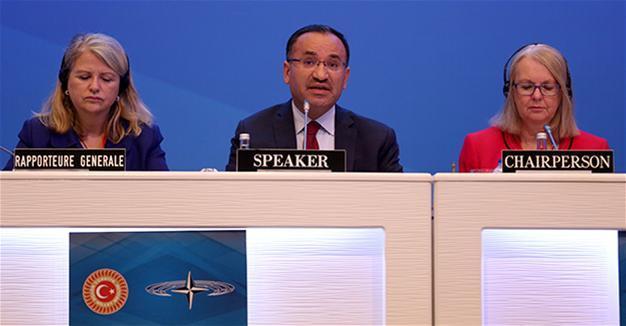NATO lawmakers review threat from terrorism during annual session in Turkey
ISTANBUL

AA photo
Parliamentarians from NATO nations on Nov. 19 reviewed possible responses to terrorism threats, as well as Moscow’s challenge to the Alliance, at the NATO Parliamentary Assembly’s annual session in Istanbul.“This is our Assembly’s first opportunity to review the outcomes of NATO’s Summit in Warsaw in July,” NATO Parliamentary Assembly (PA) President, U.S. Congressman Michael R. Turner said.
Turner also welcomed the Nov. 18 phone conversation between United States President-elect Donald J. Trump and NATO Secretary General Jens Stoltenberg, adding that both had commented on the need to reduce the ongoing disparity in defense expenditure among allies.
“The United States has adopted a European Reassurance Initiative. Maybe Europeans should adopt an American Reassurance Initiative,” Turner noted.
In addition, the head of the Turkish delegation, Osman Aşkın Bak, emphasized “the important developments regarding NATO’s role in global security,” in an environment characterized by “more diverse and more dangerous challenges,” pointing out that Turkey was in the frontline, particularly in the fight against terrorism.
Bak also stressed that “this meeting has special meaning for us,” by giving top officials from Turkey the chance to share their views on NATO and explain to deputies what happened four months on from the failed coup attempt of July 15.
Turner expressed his support for Turkey in its battle with terrorism and its struggle to host some three million Syrian refugees.
“We are holding this session here in Istanbul as another way to demonstrate our solidarity with Turkey and the Turkish people, and to recognize the trauma that the coup represented,” he stressed, noting that the alliance is “in support of Turkish democracy.”
“Solidarity and democracy go hand in hand. They are NATO’s shared values,” Turner said.
However, several members raised concerns over a series of dismissals and arrests of teachers, opposition politicians, civil servants, judges and journalists as well as the military in the aftermath of the coup attempt.
“We understand a strong reaction is necessary for this traumatic experience,” Dutch legislator Salima Belhaj said. “However, we are worried about the developments the rule of law is taking in Turkey.”
Belhaj was among several NATO PA members who quizzed Justice Minister Bekir Bozdağ when he met with the Assembly’s Committee on the Civil Dimension of Security.
Bozdağ said the authorities were “working within the law” in responding to the coup attempt.
Turkish ministers complained that allies had been slow to condemn the July 15 coup attempt and appealed for more support from the West to help Turkey fight terrorism, bolster its defenses and cope with the around 3 million refugees, mostly from Syria and Iraq.
“We do not see international solidarity. This is a huge disappointment,” Bozdağ said.
Foreign Minister Mevlüt Çavuşoğlu also said Ankara was playing a key security role on NATO’s southern and eastern flanks and wanted more reassurance measures from the Alliance.
“NATO should also keep its promises … so that all NATO members can feel themselves safe and secure on the eastern and southern flanks,” Çavuşoğlu told the NATO PA’s Political Committee.
“That’s why we call on NATO to take action,” he added.
Lawmakers also adopted reports on Nov. 18 urging the Alliance’s nations to stand firm in supporting Ukraine and maintain a strong stance against Russian belligerence.
“It is clear that conditions for an improved relationship currently do not exist; that Russia’s foreign policy priorities and the values underpinning these priorities remain in fundamental conflict with those of NATO,” said a report adopted by the NATO PA’s Political Committee.
“Through its actions and rhetoric, Russia continues to unsettle the European security environment and undermine the stability upon which Alliance security depends.” it added.
NATO Secretary General Jens Stoltenberg, Turkish President Recep Tayyip Erdoğan, several senior government ministers and a plethora of security, defense and migration experts will join the legislators over four days for what is the NATO PA’s 62nd annual session.
















